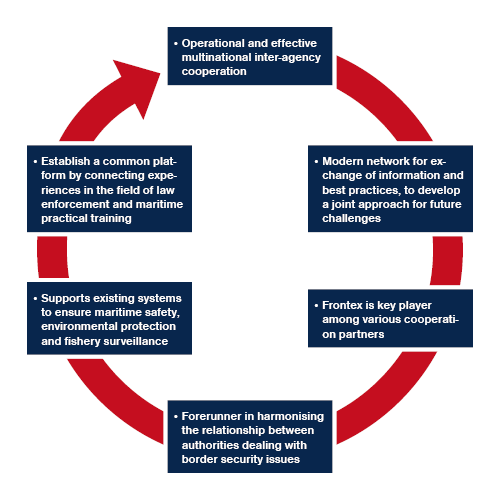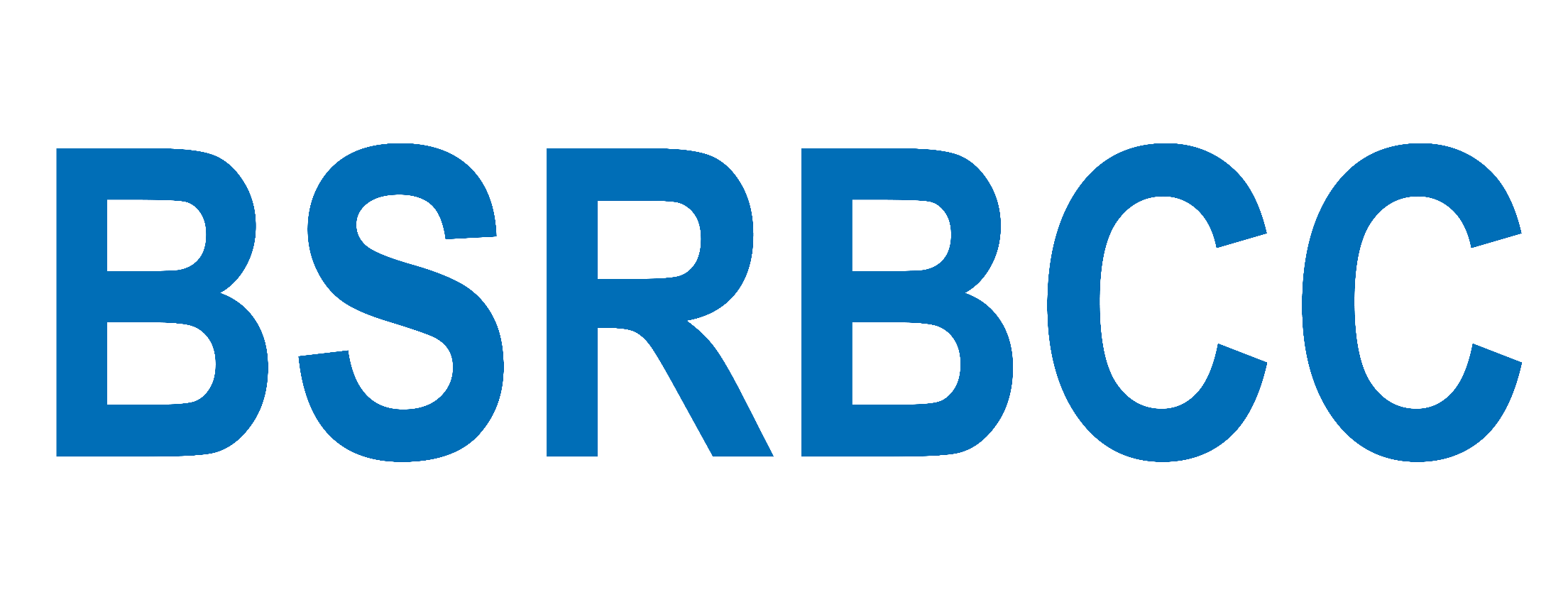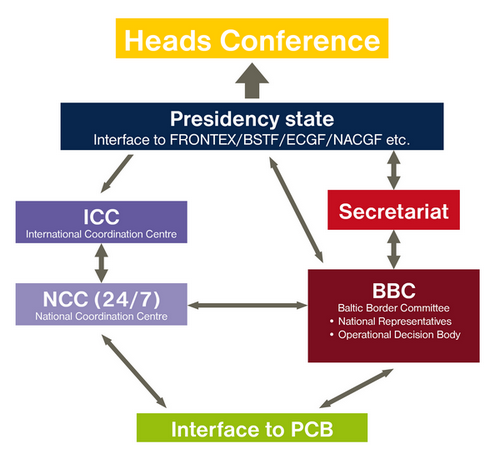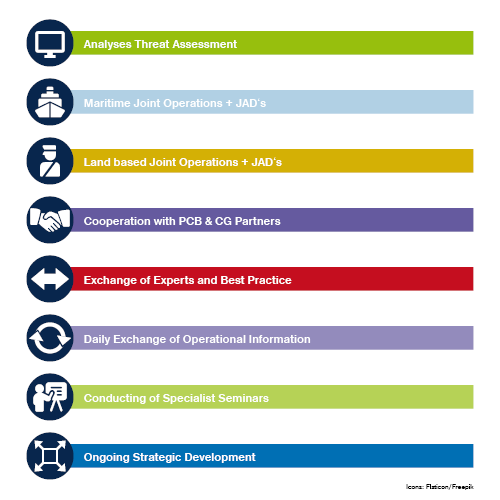Structure of the BSRBCC
Heads Conference
The meeting of the BSRBCC Border Guard Chiefs continues to take place annually. The meeting of chiefs serves as the supreme body for the cooperation initiative, and it approves the operational strategy. An operational and economic mandate for cooperation is created through the meeting of chiefs.
The presidency of the BSRBCC lasts one year. Every change of presidency is implemented with the support of the previous presidency nation, which in particular should support the Secretariat and the ICC. A qualitative continuation of the cooperation will thus be ensured in connection with any change of presidency.
BSRBCC Secretariat
In order to grant continuity in the BSRBCC, the composition of the BSRBCC- Secretariat follows a revolving system, this means the Secretariat is composed of representatives of the previous BSRCCC-Presidency (2019-Denmark, 2020/21-Germany), the current BSRBCC-Presidency (Poland) and the following BSRBCC-Presidency (2024-Finland). The BSRBCC-Secretariat serves as a tool for the presidency state and coordinates any interfacing with other cooperation bodies (Frontex, Baltic Sea Task Force, Council of the Baltic Sea States etc.).
The Secretariat is the essential representative for the cooperation initiative in cooperation with other bodies.
The BBC evaluates the interaction with other cooperation forms, while the Secretariat supports the presidency country in the planning and coordinating of operative activities on demand.
Baltic Border Committee (BBC)
The Baltic Border Committee (BBC) forms the operative supreme body of cooperation. The BBC is a cooperation network that is formed of individuals who represent national points of contact. It is tasked with preparing and implementing the cooperation strategy. The BBC is authorised to implement the strategy by putting operative practices into action between countries in the Baltic Sea Region. All information about joint operations is to be linked to the BBC, whose core task is to network joint operations, drawing primarily on existing structures, and creating new ones if required, whilst taking local needs into account. Through the BBC, national representatives integrate national action and local cooperation into wider cooperation as necessary. The BBC convenes at the initiative of the presidency state or the Secretariat, and whenever necessary at the initiative of a national representative.
Drawing on the information exchange network that has been formed, the BBC is responsible for coordinating national information about joint operational sectors covering the entire area, thus enabling functional analyses and threat assessments in the operational sectors. Furthermore, the BBC is responsible for collecting and communicating information about local joint operations. The BBC’s national representative has a key role in coordinating bilateral and multilateral cooperation.
National Coordination Centre (NCC)
The National Coordination Centre (NCC) is a central national communication and operative contact point for and to the respective authorities of the Baltic Sea Region. By using the NCC network, the partners exchange operational information in real time (24/7). Each participating state will bring the resources of the NCC up to a level that enables daily cooperation.
The NCC conveys the information required in joint operations from the national level to the ICC and vice versa. Additionally, the role of the NCC is to identify solutions to concrete problems in the field of action for cooperation at a national level, either in its own organisation or that of other competent authorities.
International Coordination Centre (ICC)
The presidency state runs an International Coordination Centre (ICC), in replacement of or in addition to the National Coordination Centre (NCC).
The ICC coordinates the information exchange with respect to the obligations of the presidency state.
History
The foundation of a cooperation of law enforcement agencies working at the borders in the Baltic Sea Region was initiated by Finland’s Foreign Secretary, Mrs Tarja Halonen, during a conference of the Council of the Baltic Sea in Kalmar / Sweden in 1996.
Consequently the establishment of the BSRBCC (Baltic Sea region Border control Cooperation) was decided in Turku/Finland in the context of the first meeting of the heads of the Border Guard Services of the -10- Baltic Sea States in 1997.
Member states are: Estonia, Denmark, Finland, Germany, Latvia, Lithuania, Norway, Poland and Sweden. Iceland holds an observer status. Cooperation with the Russian side within the forum had been carried out until February 24, 2022
The field of operations of the BSRBCC covers extensively the entire field of cross - border criminality and carries out environmental protection in the maritime area.
National coordination centres (NCC) which are connected 24/7 have been built up in all member states. Moreover, the BSRBCC is the frame for carrying out operations, further education and regular meetings, also under observation and participation of Frontex.
According to Frontex, the BSRBCC is regarded as an example for other cooperation forms.
Vision and Mission of the BSRBCC
"We have the spirit and the body to make the Baltic Sea Region remain secure in the future"
- BSRBCC is an operational and effective multinational inter-agency cooperation, counteracting border-crossing crime with a maritime focus
- BSRBCC offers a modern network for the exchange of information, knowledge and best practices, in order to develop a joint approach to future challenges
- BSRBCC establishes a common platform by connecting experiences in the fields of law enforcement and maritime practical training
- BSRBCC supports existing systems aimed at ensuring maritime safety, as well as environmental protection and fishery surveillance
- BSRBCC is a forerunner in harmonising the relationship and cooperation between authorities dealing with maritime and border security issues in the Baltic Sea region
- BSRBCC has various cooperation partners; FRONTEX as a key player being the most important one."
Mission



